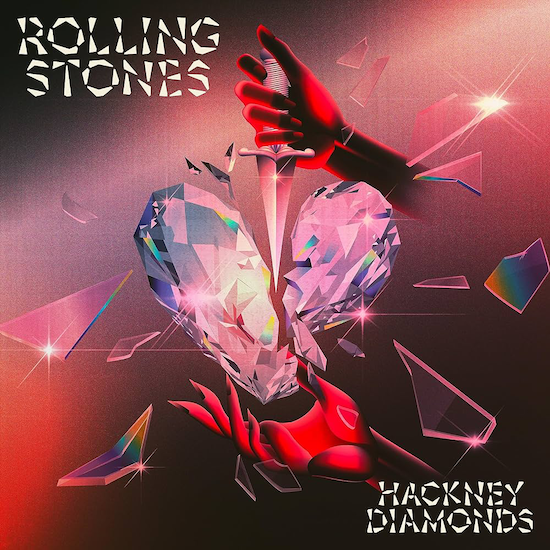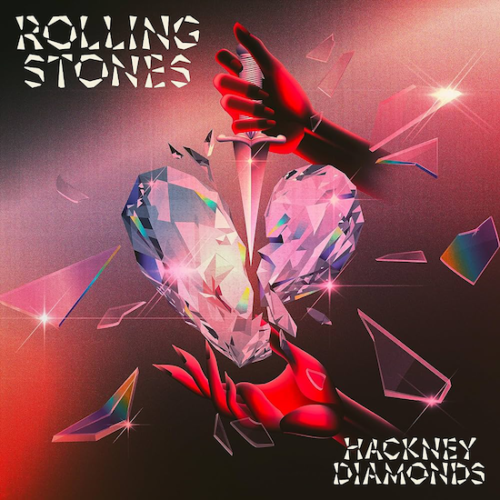Andrew Watt is 32 years old, a veritable whippersnapper to rockstars in their 70s or 80s. Raised in New York, Watt would have been at an impressionable age during the so-called “loudness war” which began in the late 90s and lasted beyond the release of Metallica’s Death Magnetic in 2008. Eager for their music to blow away its rivals, producers and engineers would decrease — or “compress” — the dynamic range of a song so that its average levels were almost as high as its peaks, the competition between record companies leading to an unprecedented widespread lack of dynamic range. The results were less easy on the ear than Mr. Blonde from Reservoir Dogs.
CDs such as Californication by Red Hot Chili Peppers, produced by Rick Rubin and mastered by Vlado Meller, rocketed out of the speakers as intended – especially those installed in American cars – and sold in their millions even though the music, loud as intended, was decidedly unpleasant to experience because it had not been allowed to breathe as it ought. Some people still believe this is an acceptable approach.
Like Rubin, Andrew Watt has worked with hip hip, pop and rock artists and the ambitious producer might well see himself as the pretender (or else smiling, dagger-wielding usurper) to the beardy one’s crown. Following literally in Rubin’s footsteps, Watt was also once resident of the Weinstein dorms at NYU. He dropped out of his studies, presumably before sitting the key module ‘How To Dodge The Velvet Revolver’ and engaging with one of its core texts, Chapter Seven in Greg Milner’s Perfecting Sound Forever. It concerns Californication and is called ‘The Story Of The Band That Clipped Itself To Death (And Other Dispatches From The Loudness War)’. Watt has since become good mates with Chad Smith.
In 2023 Iggy Pop released Every Loser, an album championed as a return to his rough and ready garage rock roots. Every Loser was mastered by Matt Colton, mixed by Alan Moulder and produced by Andrew Watt who also played multiple instruments. “This album was created to be played as loud as your stereo will go,” boasted Watt at the time. Even if Pop was as prone as ever to rhyme “bucket” with “fuck it”, the songs themselves weren’t bad but they sounded dreadful, harking back less to the scuzzy heyday of The Stooges than Jane’s Addiction’s disappointing comeback album, Strays, from two thousand and bloody three.
So guess which hot producer was hired for The Rolling Stones’ first album of original material since Top Of The Pops was still being broadcast and the Crazy Frog ringtone was a hit? This man needs to be stopped before he curtails The Cure, bungs Neil Young and erodes Depeche Mode.
Exhibit number one is Hackney Diamonds‘ lead single and opening track ‘Angry’. What has really riled Mick “moves like” Jagger on this song? Is it, as described in its verses, the unwelcome sex boycott that’s been imposed by a partner on the still-horny 80-year-old for reasons he cannot fathom? (i.e. bawling about lack of balling.) Or could he be miffed that he’s had to strain his vocals to the point of emergency surgery just to be heard over such an unnecessarily walloping drum sound?
It’s a similarly sorry situation on the next number, ‘Get Close’. The individual instrumental parts blend into one monolithically ugly blob, suffering a similar fate to the catatonic souls collectively imprisoned and intertwining within Freddy Krueger’s gammy chest. The highlight of the whole four minutes comes when Jagger stops wailing for thirty seconds and the music breaks down a little to make space for the one element of the song that stands out: a moderately enjoyable saxophone solo. This is what happens when you appoint someone who is not only a fan of RHCP’s diminishingly returning letch funk but also the regrettably Rubinian way it’s been recorded and released.
Hackney Diamonds‘ strongest factors are often lost in the sonic Krueger torso. ‘Whole Wide World’ just about survives as a catchy and uplifting anthem with some nicely spiky guitar solos. To be fair its producer, this song is readymade for soaring romantically down the highway, fleeing one’s woes and freshly embarking on a bold new adventure. It suits the Chevrolet’s radio. Let’s give him that one.
‘Dreamy Skies’ works as a honkytonk ballad-by-numbers, even if the Stones have essentially written and recorded this same song countless times before. Similarly squinting to see the lighters in the air is ‘Sweet Sounds Of Heaven’ with Stevie Wonder on piano and Lady Gaga whooping repetitions of Jagger’s lyrics while holding less back than Dostoevsky at the roulette table.
Livening the rhythms noticeably, the late Charlie Watts can be heard on two songs. During Watts’ first appearance on ‘Mess It Up’, his distinctive and carefree style could well, for the emotionally invested, raise smiles and tears at the same time. ‘Live By The Sword’ is not quite as moving. This is less Watts’ fault than that of the song. Bill Wyman and Elton John take part too and although the choruses suggest Jagger is looking (once again) to get his end away, its verses heed warnings, less generous than he thinks they are, about what to expect if you “look like a whore” and the kind of behaviour that will come back to “fuck you in the ass”.
When Bob Dylan, then only 57, swept up at the 1998 Grammy Awards with the critically acclaimed Time Out Of Mind and the Stones barely scraped one nomination in a minor category, it suggested that wrinkling rockers who ruminate and reflect on the passage of time are held in higher regard than those hip-shakers who pretend their youth is perpetual. On ‘Depending On You’ Jagger sounds more vulnerable than elsewhere, claiming poignantly that he is “too young to die and too old to lose”. That said, he’s still complaining about the lack of sex, not his fault of course, which he very much wants us to know that he continues to enjoy with virility.
Respite from Jagger’s concupiscent hooting is provided by ‘Tell Me Straight’, sung by Keith Richards. Here the recording is strikingly sparse and more skeletal than elsewhere, its haunting atmosphere at sublime odds with all those wonderful interviews in which Richards ends every sentence with a delighted cackle. But then the highlight of a rock group’s new album probably shouldn’t make listeners look forward to one member’s next solo record.
The bass playing on the almost punkish ‘Bite My Head Off’ is performed by Sir Paul McCartney, using fuzzier and denser distortion than he usually does. It was only two years ago that Macca dismissed the Stones as a “blues cover band”. He said the net cast by his own band, a forgotten little beat combo called The Beatles, was “a bit wider than theirs”. Jagger responded but Macca’s slight must already be water under the bridges to Babylon. It was McCartney, we are told, who suggested Andrew Watt as a replacement producer after the Stones’ preliminary sessions with Don Was stalled.
One explanation for this is that McCartney is the latest in a long line of living legends to have been seduced first by Rick Rubin (they made the 3, 2, 1 miniseries together) and in turn by Watt who he has apparently been recording with himself, although the fruits of the pair’s session are yet to hit the greengrocers.
Here’s another theory.
Back in the day, The Beatles were both friends and rivals with The Rolling Stones. It didn’t stop there. When McCartney returned to touring at the turn of the 90s, critics were keen to compare his concerts, favourably or otherwise, to those of the Stones who’d long established themselves as Arena royalty. The latter were capable of making a heavier “ruckus” noted Jon Pareles of The New York Times, who sensed McCartney’s shows valued straightforward proficiency over any kind of “rock spontaneity”. Robert Hilburn of Los Angeles Times preferred the ex-Beatle’s efforts which he felt made for a warmer and “more emotionally satisfying experience” than the Stones, with “stronger new material” to boot.
Shortly after the estate of Elvis Presley kicked off its promotional campaign for the Artist Of The Century box set, The Beatles brand hit back with the compilation 1. This was, as Record Collector‘s Pam Mitchell saw it, “a strategic Scouse ‘sod off’ in response”. The Beatles Anthology, lest we forget, was followed a few years later by the Wingspan documentary and two-CD best-of. By this time critics such as MOJO‘s Mick Houghton were growing less afraid of sounding like Alan Partridge when insisting that “for the most part these songs genuinely measure up to the standard of The Beatles’ McCartney-penned tracks.”
In 1997 McCartney released one of his best solo albums, Flaming Pie, off the back of Oasis’ bluster about being bigger than The Beatles. McCartney may be surprisingly humble for one of the most famous musicians who ever lived but he also has the steely competitiveness of a top-seeded tennis ace.
So when Ronnie Wood told him the sessions with Don Was weren’t going well and The Rolling Stones needed “someone to kick us up the fucking arse”, did McCartney recommend the person he genuinely thought was best for the job?
Or did he secretly know that this RHCP enthusiast would inevitably crank the bejesus out of what could have been his rivals’ best record for ages, knowing that after the initial fanfare had died down it would receive fewer repeated listens than Every Loser by Iggy Pop?
It’s sabotage, I tell thee!
Hackney Diamonds is out today



